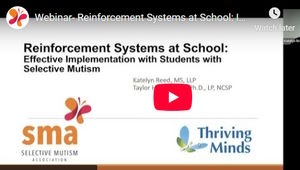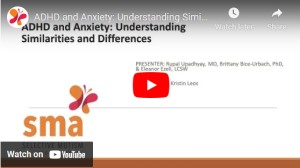Videos
Selective Mutism in the Schools: Resources for Supporting Intervention and Collaboration
Presented by Brittany Bice-Urbach, Ph.D.
Recorded September 14, 2021
This webinar is geared educators and professionals working in school settings. Parents and treating providers may also find this information valuable in their collaboration work with schools. Click here for the presentation slides.
Description: The school setting is often one of the most significantly impacted locations for a child’s comfort speaking and is often the first place where selective mutism may be recognized. Research suggests that unaddressed and unsupported SM symptoms can lead to long-term impacts for a child across academic, social, and emotional functioning. Despite these impacts, it can often be challenging for educators and professionals working in the school setting to know the best practices for supporting a child and making meaningful change through intervention. This webinar, hosted by SMA Board Member and child psychologist Dr. Brittany Bice-Urbach, will provide a) an overview of selective mutism symptoms and considerations for identifying SM in a school setting; b) practical treatment recommendations for addressing SM in a school setting; c) recommendations around collaboration across school team-members, families, and outside providers; and d) a highlight of the Selective Mutism Association Educator’s Toolkit which provides useful resources for educators and professionals in school settings. While the webinar will be geared toward educators and professionals working in school settings, parents and treating providers may also find this information valuable in their collaboration work with schools.
Speaker: Brittany Bice-Urbach, Ph.D.
Dr. Bice-Urbach is an Assistant Professor in the Department of Pediatrics at the Medical College of Wisconsin and a clinical psychologist at the Child Development Center, at the Children’s Hospital of Wisconsin. She also has a clinical specialty in treating children and adolescents with anxiety disorders through cognitive behavioral therapy (CBT) with a primary focus on treating children with Selective Mutism. At the Child Development Center, she has been offering assessment, individual therapy, and family/school consultation and training to support children with SM. She has participated in the Selective Mutism Training Institute and given several national presentations at the National Association for School Psychologists Annual Convention on the topic of addressing symptoms of SM in a school setting. She also has prioritized trainings for medical facilities and pediatricians on detecting symptoms of Selective Mutism and supporting children and families.




